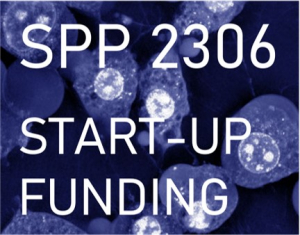© Copyright – SPP 2306 | Privacy Policy | Webdesign: Science Crunchers
Using APEX2 as a chemogenetic tool to study ferroptosis in vivo
Dr. Svenja Lorenz,
Helmholtz Munich, Institute of Metabolism and Cell Death, München
Dr. Uladzimir Barayeu,
German Cancer Research Center (DKFZ) Heidelberg, Division of Redox Regulation, Heidelberg
Classically, ferroptosis is triggered in vivo by inhibiting cellular antioxidant systems, mainly
GPX4 (Seiler et al, 2008). Inhibition of GPX4 leads to the accumulation of (phospho)lipid
hydroperoxides (PLOOH). However, to initiate lipid oxidation, free radicals are required. One
of the hypotheses is that free radicals initiating lipid oxidation are produced from hydrogen
peroxide (H2O2). However, it is not clear if H2O2 is produced upon ferroptosis induction e.g. by
the knockout of GPX4. Another important question in understanding ferroptosis is where in
the cell and which free radicals are triggering lipid oxidation.To answer these questions, we propose
to use a chemogenetic system, based on ascorbate peroxidase (APEX2).
APEX2 is an engineered heme peroxidase that can be stably expressed
in cells (Lam et al., 2015). APEX2 utilizes H2O2 to oxidize a substrate in one-electron steps.
Depending on the substrate provided, APEX2 can be used to either to detect H2O2 with
chromogenic, fluorogenic or luminogenic substrates or generate free radicals.
remaining Start-up funding projects 2021 – 2024
- Markers of lipid peroxidation and ferroptosis sensitivity in metastasis to liver and lung
Dr. Christina Bebber,
CECAD, Cluster of Excellence for Aging Research, University of Cologne
Dr. Felix C. E. Vogel,
Division of Tumour Metabolism and Microenvironment, German Cancer Research Center (DKFZ), Heidelberg
- Deciphering the role of hepcidin in ferroptotic-mediated liver damage in hemochromatosis
Dr. Carolin Lohr,
Division for Gastroenterology, Hepatology and Infectiology, University Hospital Duesseldorf
Dr. Marlene leTertre,
Molecular Medicine Partnership Unit (MMPU), University Hospital Heidelbergof Tumour Metabolism and Microenvironment, German Cancer Research Center (DKFZ), Heidelberg



 Barayeu et al., 2023
Barayeu et al., 2023